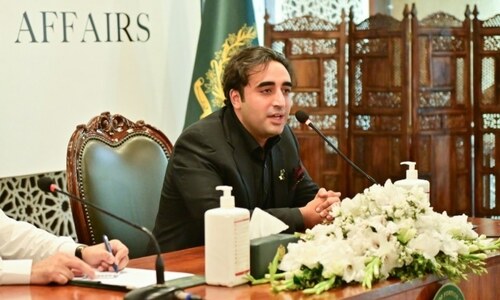WASHINGTON: Foreign Minister Bilawal Bhutto-Zardari has said that Islamabad is looking to the Taliban regime in Afghanistan to play its role in discouraging the increase in terrorist activity on Pakistan’s side of the border.
“We continue to not only monitor this situation, but work on our side to ensure that we can try to tackle the threat of terrorism and hope that the regime in Afghanistan lives up to their international commitment to not allow their soil to be used for terrorism,” the foreign minister said in an interview with CNN’s Christiane Amanpour when asked how he sees the Afghan Taliban government, after reports emerged that Kabul had brokered a ceasefire between the Pakistani military and banned Tehreek-i-Taliban Pakistan.
When asked what it will take for Pakistan to accept the current administration in Kabul, Mr Bhutto-Zardari said any decision in this regard will be taken in line with the discussions with the international community. At the same time, he added, “we continue to advocate for engagement, particularly in light of the humanitarian crisis developing in Afghanistan”.
When asked if Islamabad had engaged with the Afghan Taliban on how Muslim countries can give rights to women, the minister said it wasn’t an issue of the West. “I see women’s rights or women’s rights to education as rights granted to us in Islam. We’ll be emphasising that the Taliban keep their international commitments and ensure rights to the women of Afghanistan.”
To Ms Amanpour’s comment that the US believed Pakistan had played a “very dangerous role” in supporting the Afghan Taliban over the decades, Bilawal maintained Pakistan has consistently engaged with Afghanistan regardless of who was in power. “We have always been advocates of the fact that alongside action against terrorist activity, the resolution of the dispute was in dialogue and diplomacy and ultimately, despite Pakistan being at the receiving end of criticism for maintaining and sustaining this position, the international community went down that route while resolving the conflict and issues in Afghanistan.”
He added that the developments in Kabul have had a direct impact on the lives of the people of Pakistan. “We must prioritise, alleviate the humanitarian crisis, ensure there’s no economic collapse and hold the Taliban regime to the international commitments. It was not Pakistan, but the US who had direct communication with the Taliban regime before their takeover of Kabul. Pakistan and international community believe it will not serve any of our interests if we abandon the people of Afghanistan once again.”
Published in Dawn, May 19th, 2022















































